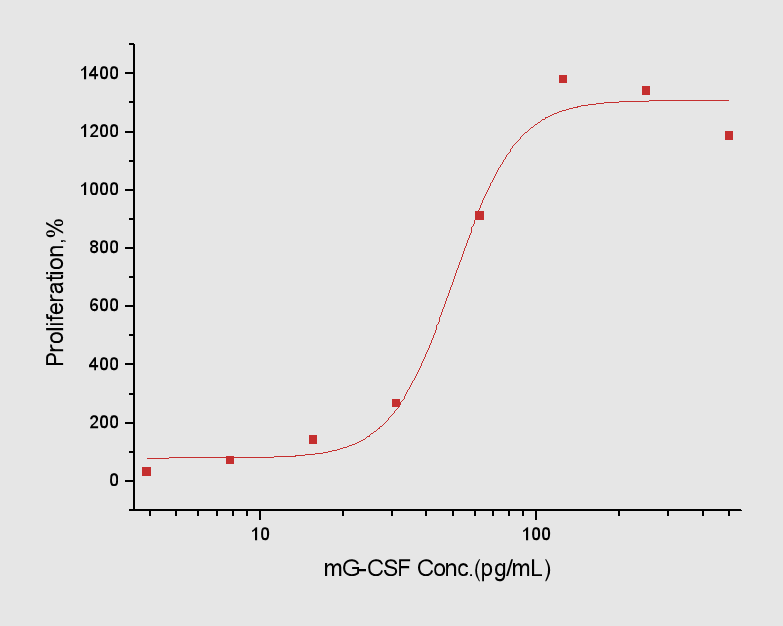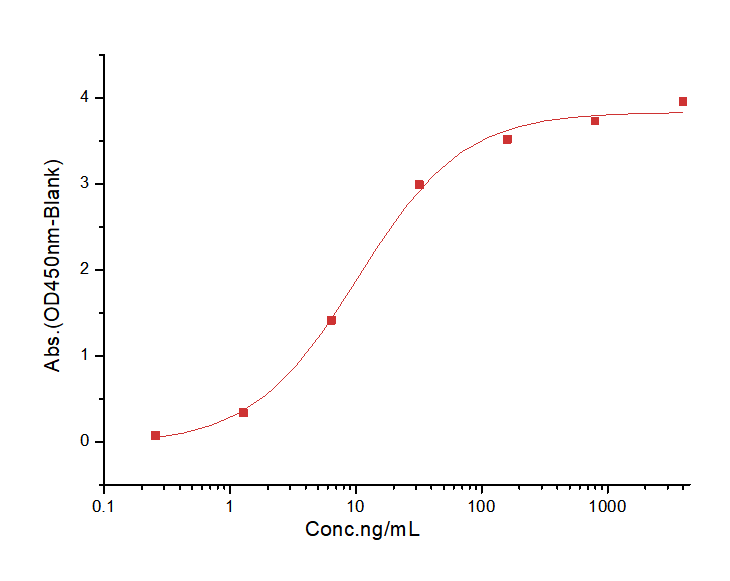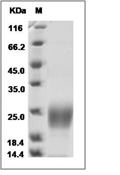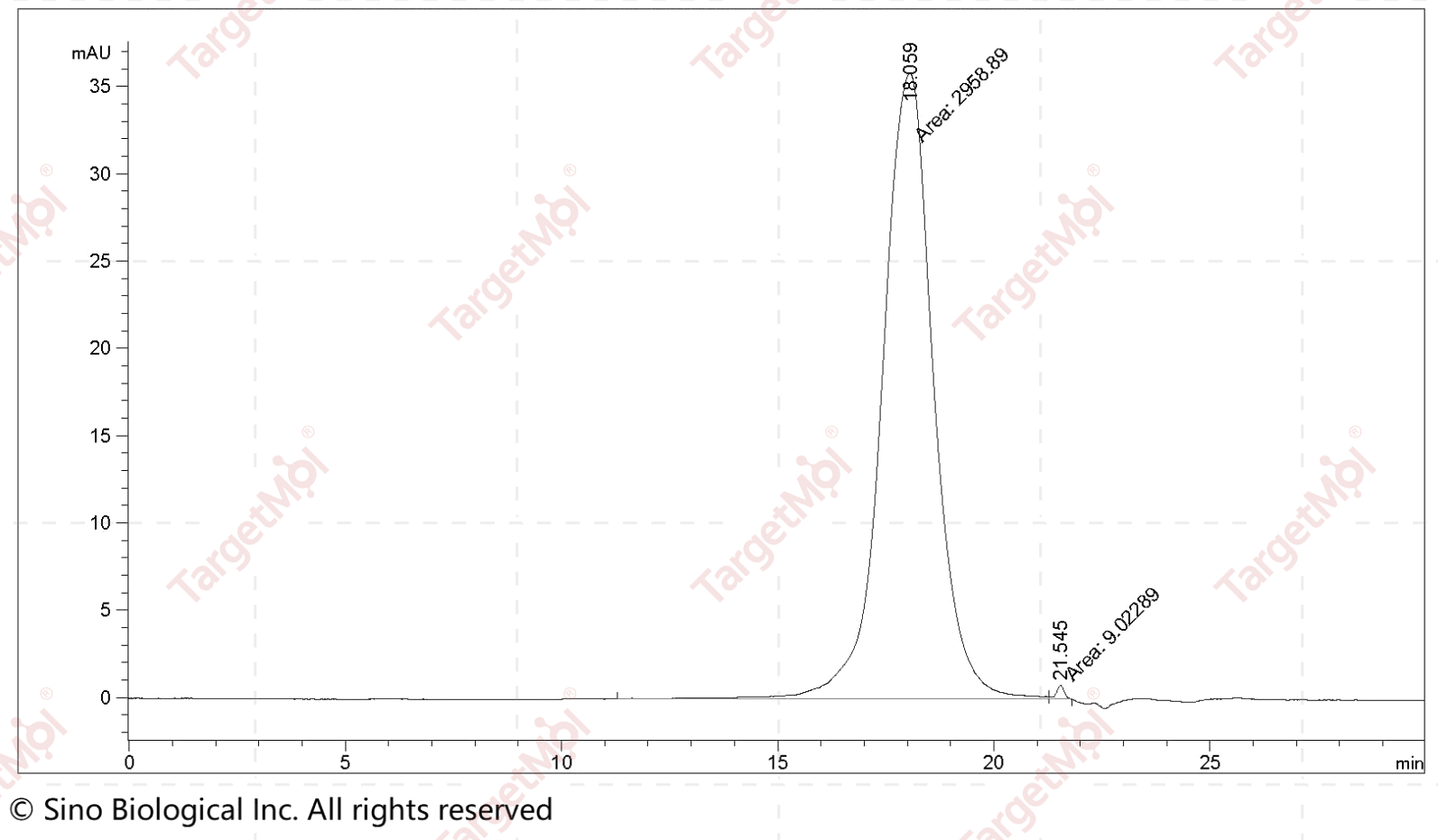Shopping Cart
Remove All Your shopping cart is currently empty
Your shopping cart is currently empty
G-CSF Protein, Mouse, Recombinant is expressed in HEK293 mammalian cells. The predicted molecular weight is 19 kDa and the accession number is P09920.

| Pack Size | Price | USA Warehouse | Global Warehouse | Quantity |
|---|---|---|---|---|
| 5 μg | $129 | - | In Stock | |
| 10 μg | $212 | - | In Stock | |
| 20 μg | $353 | In Stock | In Stock | |
| 50 μg | $490 | - | In Stock | |
| 100 μg | $653 | - | In Stock | |
| 200 μg | $852 | - | In Stock |
| Biological Activity | 1. Measured in a cell proliferation assay using NFS-60 mouse myelogenous leukemia lymphoblast cells. The ED50 for this effect is 40-160 pg/mL.
2. Immobilized G-CSF Protein, Mouse, Recombinant, HPLC-verified at 2 μg/ml (100 μl/well) can bind CSF3R/G-CSFR Protein, Human, Recombinant (hFc Tag), The EC50 is 7-38 ng/mL.   |
| Description | G-CSF Protein, Mouse, Recombinant is expressed in HEK293 mammalian cells. The predicted molecular weight is 19 kDa and the accession number is P09920. |
| Species | Mouse |
| Expression System | HEK293 Cells |
| Tag | Tag Free |
| Accession Number | P09920 |
| Synonyms | MGI-IG,G-CSF,Csfg,colony stimulating factor 3 (granulocyte) |
| Construction | A DNA sequence encoding the mouse CSF3 (NP_034101.1) (Met1-Ala208) was expressed and purified. Predicted N terminal: Val 31 |
| Protein Purity | > 95 % as determined by SDS-PAGE.
> 95 % as determined by SEC-HPLC.   |
| Molecular Weight | 19 kDa (predicted) |
| Endotoxin | < 1.0 EU/μg of the protein as determined by the LAL method. |
| Formulation | Lyophilized from a solution filtered through a 0.22 μm filter, containing PBS, pH 7.4. Typically, a mixture containing 5% to 8% trehalose, mannitol, and 0.01% Tween 80 is incorporated as a protective agent before lyophilization. |
| Reconstitution | Reconstituted with sterile deionized water to 0.25 mg/mL. Reconstitution conditions may vary depending on the lot. |
| Stability & Storage | It is recommended to store recombinant proteins at -20°C to -80°C for future use. Lyophilized powders can be stably stored for over 12 months, while liquid products can be stored for 6-12 months at -80°C. For reconstituted protein solutions, the solution can be stored at -20°C to -80°C for at least 3 months. Please avoid multiple freeze-thaw cycles and store products in aliquots. |
| Shipping | In general, Lyophilized powders are shipping with blue ice. |
| Research Background | Granulocyte-colony stimulating factor (G-CSF) is a growth factor and an essential cytokine belonging to the CSF family of hormone-like glycoproteins. It is produced by numerous cell types including immune and endothelial cells. G-CSF binding to its receptor G-CSF-R which belongs to the cytokine receptor type I family depends on the interaction of alpha-helical motifs of the former and two fibronectin type III as well as an immunoglobulin-like domain of the latter. Recent animal studies have also revealed that G-CSF activates multiple signaling pathways, such as Akt and also the Janus family kinase-2 and signal transducer and activation of transcription-3 (Jak2-STAT3) pathway, thereby promoting survival, proliferation, differentiation and mobilisation of haematopoietic stem and progenitor cells. G-CSF is a cytokine that have been demonstrated to improve cardiac function and perfusion in myocardial infarction. And it was initially evaluated as a stem cell mobilizer and erythropoietin as a cytoprotective agent. G-CSF prevents left ventricular remodeling after myocardial infarction by decreasing cardiomyocyte death and by increasing the number of blood vessels, suggesting the importance of direct actions of G-CSF on the myocardium rather than through mobilization and differentiation of stem cells. Accordingly, recombinant human (rh)G-CSF has been extensively used in clinical haematology and oncology to enable bone marrow transplantation or to treat chemotherapy-associated neutropenia. In preclinical study, G-CSF improved cardiac function and perfusion by angiomyogenesis and protection of cardiomyocytes in myocardial infarction.Cancer ImmunotherapyImmune CheckpointImmunotherapyTargeted Therapy |
| Size | Quantity | Unit Price | Amount | Operation |
|---|

Copyright © 2015-2026 TargetMol Chemicals Inc. All Rights Reserved.